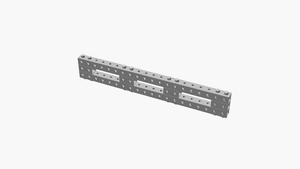Trusses: Difference between revisions
No edit summary |
No edit summary |
||
| Line 13: | Line 13: | ||
=Introduction= | =Introduction= | ||
A truss consists of [[frames]] connected at joints. Trusses are typically composed of triangles because of the structural stability of that shape and design | A truss consists of [[frames]] connected at joints. Trusses are typically composed of triangles because of the structural stability of that shape and design. | ||
=Challenges= | =Challenges= | ||
A triangle is the simplest geometric figure that will not change shape when the lengths of the sides are fixed. In comparison, both the angles and the lengths of a four-sided figure must be fixed for it to retain its shape. | |||
=Approaches= | =Approaches= | ||
Revision as of 19:57, 16 May 2021
Introduction
A truss consists of frames connected at joints. Trusses are typically composed of triangles because of the structural stability of that shape and design.
Challenges
A triangle is the simplest geometric figure that will not change shape when the lengths of the sides are fixed. In comparison, both the angles and the lengths of a four-sided figure must be fixed for it to retain its shape.
Approaches
-
Simple truss
-
Truss with spacers
Space frame (3d truss)
In architecture and structural engineering, a space frame or space structure (3D truss) is a rigid, lightweight, truss-like structure constructed from interlocking struts in a geometric pattern. Space frames can be used to span large areas with few interior supports. Like the truss, a space frame is strong because of the inherent rigidity of the triangle; flexing loads (bending moments) are transmitted as tension and compression loads along the length of each strut.


